The Quickest Method of Treating Hemorrhoids During Pregnancy
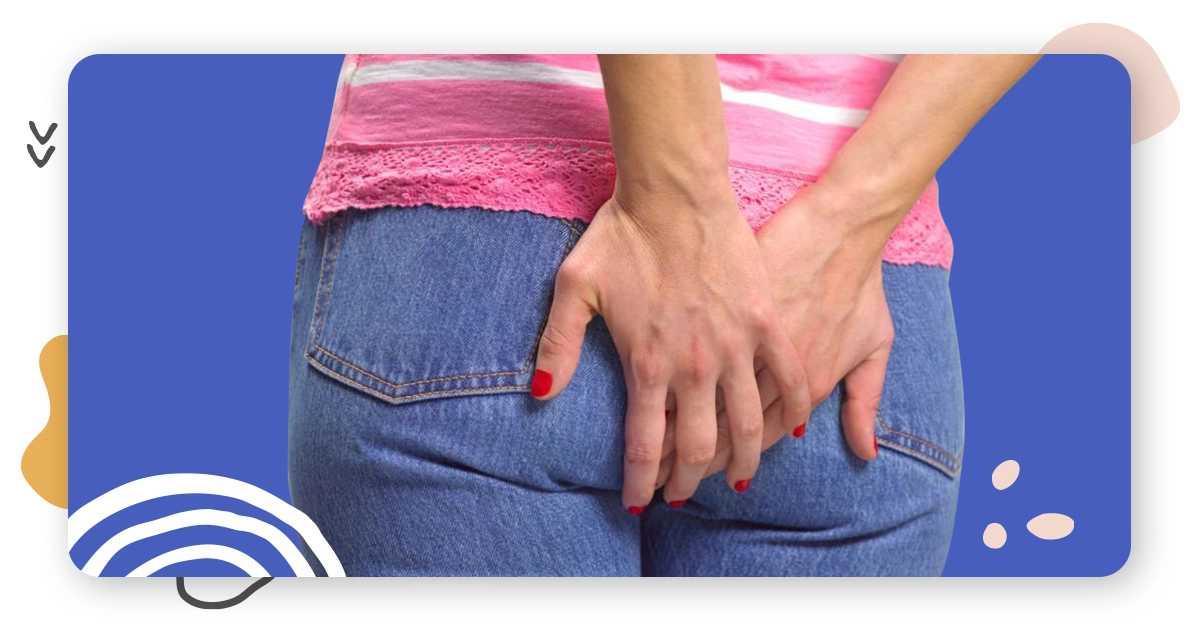
Hemorrhoids, also known as piles, is an unpleasant condition that affects several women during pregnancy….
Hemorrhoids, also known as piles, is an unpleasant condition that affects several women during pregnancy. These are nothing but swollen veins in the anus or inside the lower rectum, which can cause itching, pain, or bleeding.
Around half of pregnant women develop hemorrhoids, especially during the third trimester. The weight of a growing baby and the hormonal changes a woman goes through make pregnant women more susceptible to hemorrhoids.
While there is no denying that it is an uncomfortable condition to deal with, you may be relieved to know that it does get better soon after the delivery. Until then, simple natural remedies and lifestyle changes can help you manage it. If not, you always have other treatment options, which your doctor may suggest to help you feel better.
Common Symptoms and Causes of Hemorrhoids During Pregnancy
Hemorrhoids can occur with or without symptoms. Some common symptoms visible in pregnant women with hemorrhoids include the following:
- Swelling
- Pain During a Bowel Movement
- Itchy and Irritated Lump Near the Anus
- Itching and/or Burning Sensation in and Around the Anus
- Severe Pain Due to a Prolapsed Internal Hemorrhoid
- Blood Streaks in the Stool or on The tissue Paper Used After a Bowel Movement
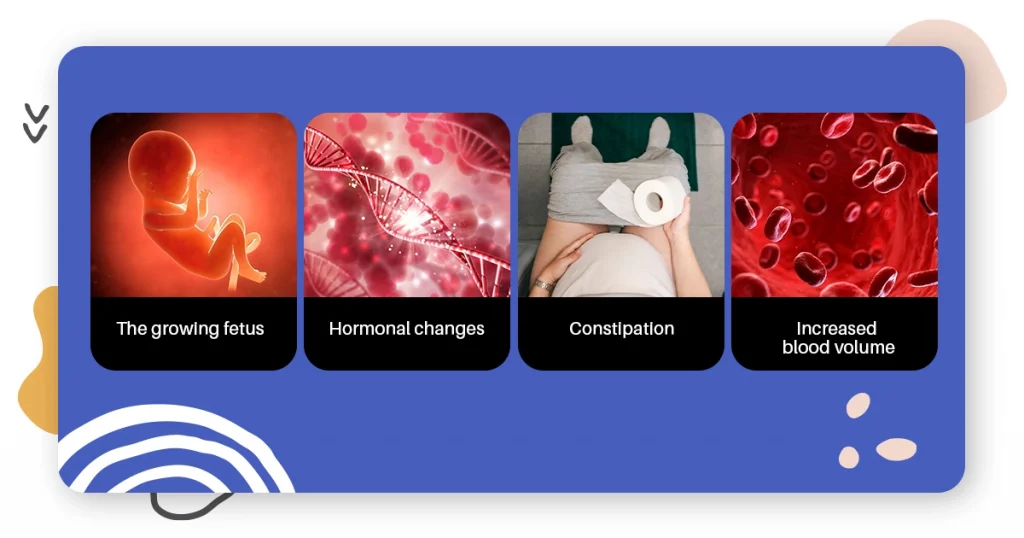
Hemorrhoids in pregnant women are not the result of just one but several factors that affect a woman’s body during pregnancy. Let’s see what they are:
1. The Growing Fetus: As the baby continues to grow in the mother’s womb, it exerts more and more pressure on the pelvic area, the intestines, and the blood vessels surrounding the anus. This increased pressure hinders the flow of blood through the veins, and the slow-moving and pooled blood causes the veins to swell.
2. Hormonal Changes: A woman’s body produces higher levels of the hormone progesterone during pregnancy. This hormone is known to relax the veins, increasing their chances of swelling and resulting in hemorrhoids.
3. Constipation: This is one of the prominent causes of hemorrhoids during pregnancy. Studies show that nearly 38% of women suffer from constipation at one point or the other during their pregnancy. Iron supplements and slow food movement within the digestive tract also contribute to constipation. Plus, straining during a bowel movement can further aggravate this condition.
4. Increased Blood Volume: Pregnancy also results in increased blood volume. Due to this, the blood vessels enlarge to support more blood flow in the body, and enlarged veins near the bottom can result in hemorrhoids.
Managing Hemorrhoids During Pregnancy
I. Lifestyle Changes
Hemorrhoids can be uncomfortably painful and irritating, especially during pregnancy, while you are also going through other challenges. Incorporating a few simple lifestyle changes can help you manage your symptoms effectively.

II. Natural Home Remedies
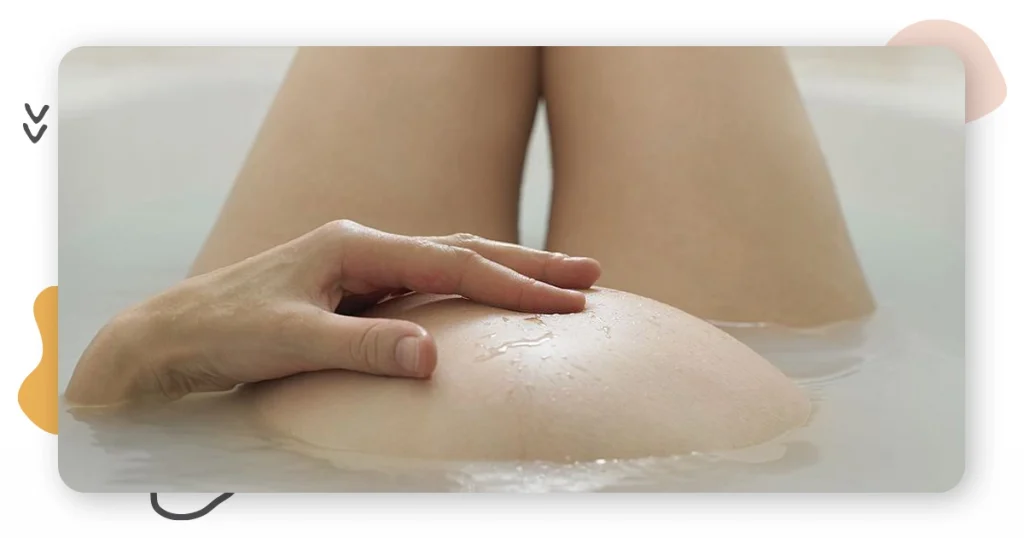
If hemorrhoids are bothering you and making your life uncomfortable, feel free to try the natural remedies we have mentioned down below to relieve the pain and discomfort.
1. Soak in a warm bath for 15 minutes a couple of times daily. You could add a cup of Epsom salt to the water to help ease swelling and irritation.
2. Apply some coconut oil to keep the area moisturized, as it will help reduce itchiness and swelling.
3. Smear some pure aloe vera gel onto the anus to minimize itching, burning, and inflammation.
4 . Apply an ice pack covered with a thin towel to the affected area for 10-15 minutes. Do this several times during the day. The cool ice will help reduce swelling and temporarily relieve the pain associated with hemorrhoids.
5. Always use scent-free and soft tissue paper or wipes to clean your bottom. You could try wetting the tissue a little bit to reduce friction and irritation.
III. Medical Treatment Options
While it is true that pregnancy-related hemorrhoids go away once the baby is born, it is vital to treat them to prevent the worsening of the condition. It is wise to consult your healthcare provider so you get the right diagnosis for your condition and get advice on possible treatment options that are safe for you and your baby. Here are some standard treatment approaches for pregnancy-related hemorrhoids –
- Topical hemorrhoid creams to relieve pain, itching, and inflammation
- Laxatives, fiber supplements, and suppositories to cure constipation
- Prescription oral medications for treating the condition
- NSAIDs for easing pain and swelling
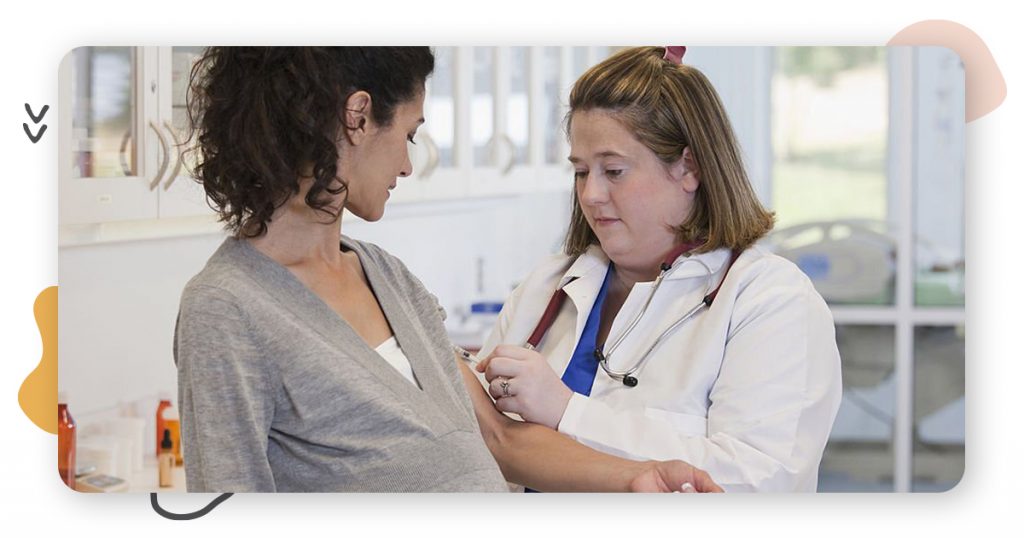
Besides the above, other treatment options such as rubber band ligation, hemorrhoidectomy, sclerotherapy, and stapled hemorrhoidopexy are also suggested by healthcare providers depending on the severity of the condition.
Precautions You Can Take to Avoid Hemorrhoids During Future Pregnancies
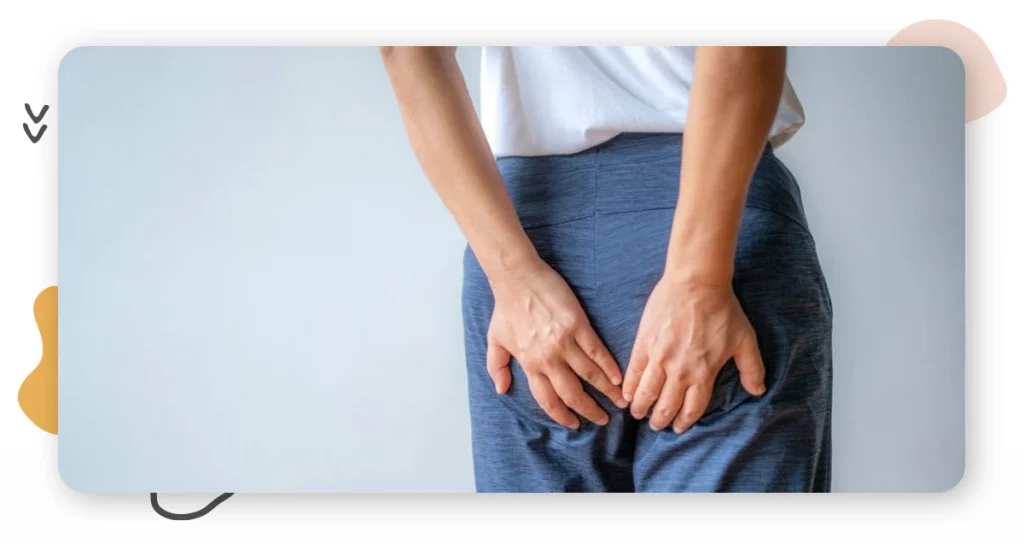
A little precaution can go a long way toward preventing hemorrhoids during pregnancy. So what can you do to save yourself from this problem? Bring in lifestyle changes early on, and not after you get hemorrhoids.
- Do not fail to hydrate. One should consume an average of 8 to 10 glasses of water each day. Your pelvic floor muscles will get stronger with kegel exercises.
- Avoid foods such as white bread, milk, cheese, and processed foods, as these can lead to constipation and hemorrhoids. Instead, eat more high-fiber foods such as beans, grains, nuts, fruits, and vegetables.
- Avoid staying in one position for too long. Get up and move if you have been sitting, or take a break to sit down if you have been standing for a long time.
- Don’t give up on exercise. Regular, moderate exercise is the best way to promote regular bowel movements and prevent the likelihood of developing hemorrhoids.
- Avoid sitting on the toilet for too long. Leave magazines and phones outside.
- Don’t hold going to the loo even for a short period. Visit the bathroom as soon as you need to go.
When Should You Consult a Doctor
Pregnant women with bearable symptoms may try lifestyle changes and home remedies to get some relief from hemorrhoids. But if you don’t feel any better after trying home remedies for a week or so, it would be better to see your doctor. Furthermore, visit your doctor right away for a consultation if:
Final Thoughts
As mentioned earlier, hemorrhoids are a common problem in pregnant women and can be pretty annoying. But timely treatment can help you manage your symptoms. Luckily, many home remedies work well to ease hemorrhoid-related discomfort. But if they don’t lessen your problems, you should seek medical advice. Your doctor will assess your condition and suggest treatment options that can reduce your symptoms and make you feel better. Since pregnancy-related hemorrhoids are short-lived, you will probably be fine with non-surgical treatment options. However, if your symptoms are severe or they do not get better after your baby is born, your doctor may suggest an alternative surgical procedure if that’s what is best for you.

